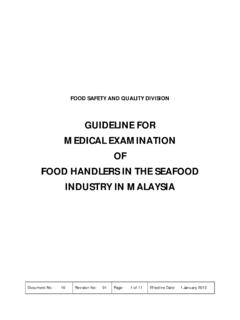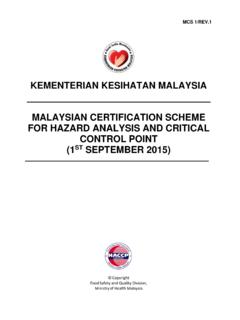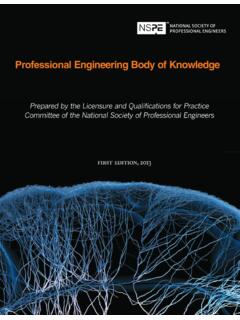Transcription of FOOD SAFETY AND QUALITY - Ministry of Health
1 1 Food SAFETY & QUALITY Division, MOH Annual Report 2011 FOOD SAFETY AND QUALITY INTRODUCTION With the increasing demand for safe food, be it for local consumption or for export, Ministry of Health (MOH) strengthened the food SAFETY control in Malaysia through the upgrading of Food SAFETY and QUALITY Division (FSQD) as a new programme headed by a Senior Director effective 1 July 2010. The FSQD as the Competent Authority for food SAFETY in Malaysia is responsible for ensuring food SAFETY along the food supply chain in order to protect the public against Health hazards and fraud in the preparation, sale and use of food through the Food Act 1983 and its regulations as well as the Food Analyst Act 2011. Under the Food SAFETY and QUALITY Programme, two (2) divisions were established, namely the Planning, Policy Development and Codex Standard Division and the Compliance and Industry Development Division. Under these Divisions, there are eight (8) Branches namely Communication and Consumerism, Policy and Research, Standard and Codex, Surveillance and Laboratory, Domestic Industry, Domestic Compliance, Import and Export.
2 The Divisions are manned by Food Technologists, Nutritionists, Medical Officers, Scientist (microbiology), Environmental Health Officers, Information Technology Officers, Health Education Officer, Assistant Food Technology Officers, Assistant Information Technology Officers and Assistant Environmental Health Officers. ACTIVITIES AND ACHIEVEMENTS POLICY AND RESEARCH BRANCH The Policy and Research Branch is responsible for managing and monitoring activities related to policy, QUALITY and innovation, regulating monitoring projects, human capital development and monitoring the development, maintenance and application of information system. It is also responsible for the maintenance of technical information within the Division s website. i. Activities carried out under the National Food SAFETY and Nutrition Council (NFSNC) The NFSNC is the highest national advisory body that provides advice related to food SAFETY and nutrition in Malaysia.
3 The council is chaired by the Honourable Minister of Health and consists of 48 members including 16 Secretaries- general and 25 Directors- general from various ministries and agencies and non-governmental organizations. NFSNC establishment was approved by the cabinet on 21 March 2001 with the objective to ensure 2 Food SAFETY & QUALITY Division, MOH Annual Report 2011 the Health of the consumers is assured by strengthening food SAFETY at all levels of the food supply chain in the country and to ensure Malaysians achieve optimum nutrition status. The 10th NFSNC Meeting was held on 8 December 2011 and chaired by the Honourable Minister of Health . It was attended by the Secretary general of the Ministry / representative, the Director general / representatives of relevant agencies, the Federation of Malaysian Manufacturers (FMM), the Federation of Malaysian Consumer Associations (FOMCA) and professional bodies represented by the presidents / representatives of their associations.
4 A total number of 21 issues, two (2) proposals and seven (7) information papers were presented during the meeting. ii. Activities involving the Key Result Area (KRA) / Key Performance Indicator (KPI) Key Results Areas (KRA) achievements which are also the Key Performance Indicators (KPI) of Deputy Minister of Health for 2011 are illustrated in Table 1. Table 1: KRA Achievement, 2011 Indicator Target Actual Percentage of food poisoning in school < % % Percentage of food poisoning in Pusat Latihan Khidmat Negara < % % Number of premises for export complying with importing countries requirements 35 36 Number of hygienic food premises 96 % 97 % Percentage of compliance to the Food Act 1983 and Food Regulations 1985. >96 % 97 % The KPI of the Director general (DG) of Health which include two (2) KPIs were monitored throughout 2011 as in Table 2. Table 2: The Achievement of KPI of DG, 2011 Indicator Target (%) Actual (%) Number of companies certified with HACCP involved in food poisoning cases.
5 < 0% Increase in the number of premises for the export of fish and fish product complying with importing countries requirements > 50 65 iii. Innovation In 2011, 16 innovation laboratory groups were formed and several innovation projects were proposed to participate in the competition. 3 Food SAFETY & QUALITY Division, MOH Annual Report 2011 Innovation Laboratory Group 1 from FSQD won the Innovation Awards Competition of Ministry of Health Institutions and Training Institute 2011 which was held on 14 July 2011. Its innovation on "Preliminary Audit under Analysis Hazard Certification Scheme and Critical Control Points (HACCP) took first place under the Management Category, while its innovation on "1 Malaysia Food SAFETY Scheme (SK1M) was awarded second place under the Technical Category. iv. Activities involving research and monitoring Projects carried out are classified into two (2) categories; National Projects which covers the entire country and Specific Projects which focuses on a specific state or issue and involves surveys or analysis being carried out in collaboration between the Division and institutions of higher education.
6 A total of 32 National and Specific Projects have been carried out within section is also responsible for monitoring projects such as the Malaysian Total Diet Study (MTDS) and research projects with government agencies such as Nutrition Division, National Institutes of Health in addition to other ad hoc cooperation from time to time. A Food SAFETY Conference 2011 was held at the Putrajaya International Convention Centre on 6-8 December 2011 where 20 papers of food SAFETY monitoring and research projects conducted utilising funds under the FSQD Programme were presented. The conference provided an opportunity to present and share research findings, exposure on the latest development in the field of food SAFETY apart from in-depth knowledge gained through the work conducted in monitoring projects as well as participating in development sessions. v. Activities involving Information and Communications Technology (ICT) Activities involving development, enhancement, maintenance and acculturation of ICT are conducted in a coordinated manner so as to support the Food SAFETY and QUALITY Programme, where two (2) application systems; the Food SAFETY System for Malaysia (FoSIM) Domestic and the Official Food Control Management System for Export to European Union (FExOC) was fully developed on 18 July 2011 and 13 December 2011 respectively.
7 Vi. Development and maintenance of FSQD website The official website of the Food SAFETY and QUALITY Division (FSQD) which can be accessed at was launched in July 2011. The improved features of this new website include the display name and banner for FSQD which is more visible at 4 Food SAFETY & QUALITY Division, MOH Annual Report 2011 the top of the website, the information displayed by groups such as knowing FSQD, activities and services, media, frequently asked questions, links, guidelines, legal, member directory, contact us, announcements, news of activities, press releases, special display (industry, public and FSQD s staff) and more. FSQD official website was given a 4-star rating during the evaluation of website of Ministry of Health . SUMMARY In 2011, the Policy and Research Branch organised the 10th National Food SAFETY and Nutrition Council, the Food SAFETY Conference 2011 and the launching of FSQD s official website, conducted 32 research projects, developed two (2) new Information and Communications Technology (ICT) application systems and formed 16 innovation laboratory groups within FSQD.
8 DOMESTIC INDUSTRY BRANCH Programs and activities related to food SAFETY assurance, good hygiene practices and conformity assessment were developed, implemented and monitored to further improve food SAFETY in the relevant food sector in order to reduce food contamination and the occurrence of food poisoning in this country. FOOD SERVICES Programmes and activities are carried to enhance the good hygiene practices in the relevant food services sector. Food Handlers Training Programme The objective of this programme is to provide knowledge on good hygiene practices in food handling including the hygiene of food premises to all food handlers to ensure the preparation of safe food which would contribute to a reduction in the occurrence of food poisoning in the country. Figure 1 shows the number of food handlers trained by Food Handlers Training Schools (SLPM) by states for 2011. In 2011, a total of 126,905 food handlers were trained by SLPM that are accredited by the MOH.
9 Since the inception of this programme in 1996, a total of food handlers have been trained whereas163 SLPM with 420 trainers have been accredited by the MOH to conduct of Food Handlers Training Courses. 5 Food SAFETY & QUALITY Division, MOH Annual Report 2011 Figure 1: Number of Food Handlers Trained by Food Handlers Training Schools by State, 2011 The Guidelines for the Accreditation Scheme of Food Handlers Training Programme was launched on 15 June 2011 by the Senior Director for Food SAFETY and QUALITY . This guideline provides guidance to the SLPM and trainers in conducting Food Handlers Training Course and to MOH s officers in carrying out monitoring and auditing of the SLPM. It also prescribes actions to be taken against SLPM or trainers who violate the conditions of accreditation set by the Ministry . Launching of Guidelines for the Accreditation Scheme of Food Handlers Training Programme by Puan Noraini Binti Dato Othman, Senior Director for Food SAFETY and QUALITY on 15th June 2011 in Putrajaya 1014107627450877029345545729401492510698 1026920437978504810206050001000015000200 002500030000350006 Food SAFETY & QUALITY Division, MOH Annual Report 2011 Self Assessment Programme (KENDIRI) in Schools The Self Assessment Program (KENDIRI) is based on the concept of shared responsibility amongst the relevant stakeholders to ensure the cleanliness of the related food premises.
10 KENDIRI program has been implemented in schools since 2008 to reduce the occurrence of food poisoning due to food prepared in school canteens and hostels. Through this program, the operators of the school canteens and hostels are empowered to conduct their own assessment on the cleanliness of the premises and the condition is monitored at various levels, that is, directly by the schools, District Education Office (PPD), District Health Office (PKD), State Education Department (JPN), State Health Department (JKN), the Ministry of Education and MOH. With the implementation of KENDIRI program, there has been a 14% decrease in the number of schools with episodes of food poisoning, from 157 schools in 2010 to 135 schools in 2011. Self Assessment Program (KENDIRI) In National Services (NS) Camp The implementation of the KENDIRI program, which was found to be an effective tool in the prevention of food poisoning in schools, was extended to the kitchen of National Service (NS) Training Camp in 2010.





![FIRST SCHEDULE 162/88, 90/99,318/12] - …](/cache/preview/5/9/4/f/4/0/6/1/thumb-594f4061e61fbd66812936804bf1f548.jpg)

